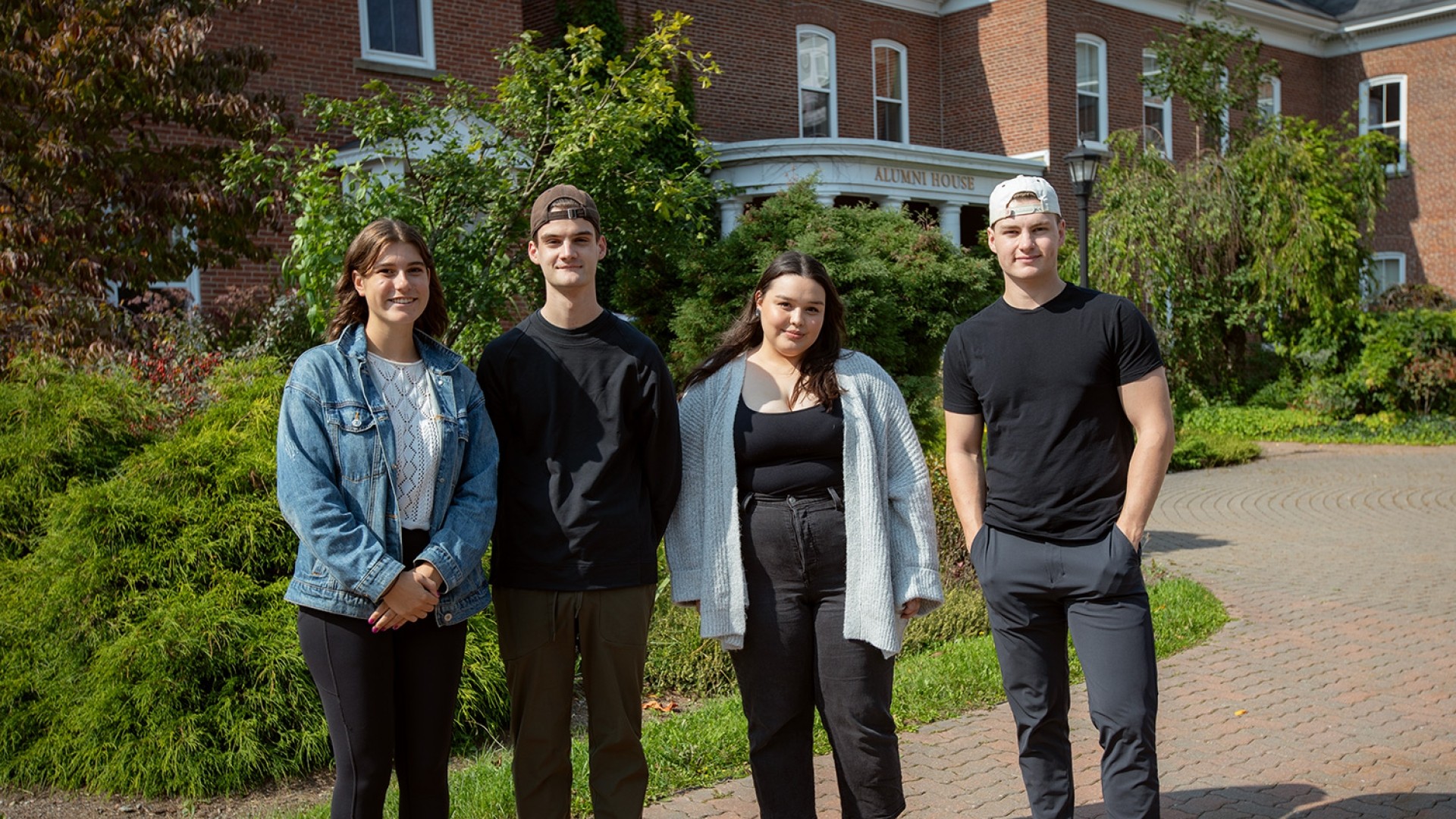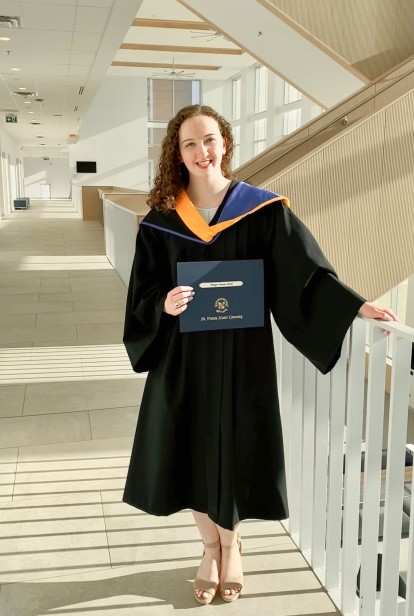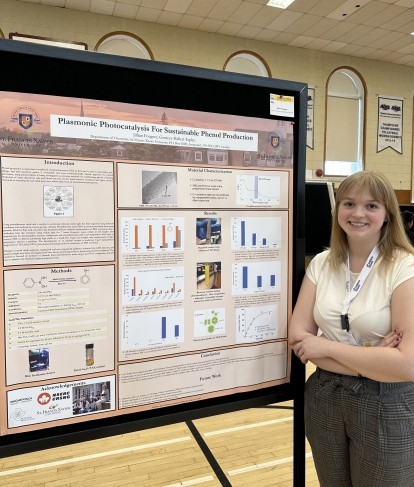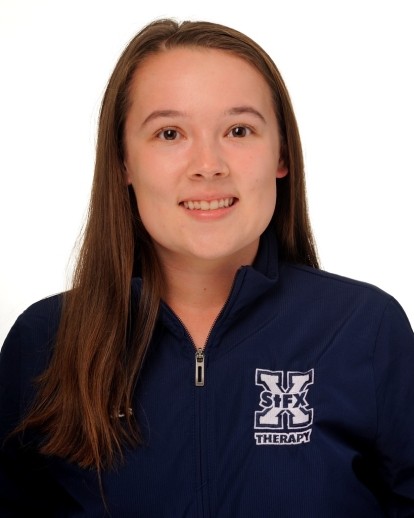
The ability to become immersed in a field they’re passionate about, to make connections with faculty and fellow students, and to see real-world impacts of their work, were just some of the benefits that 15 StFX students say they received as 2023 recipients of the NSERC Undergraduate Student Research (USRA) Award at StFX.
The award, valued at $8,000, provides up to 14 weeks employment under the supervision of a StFX faculty member.
This year’s recipients are Brooke Breen, Makayla Butorac, Tanner Clow, Jillian Fougere, Claire Keyes, Evan Pye, Noah Ruscica, Maranda van Oirschot, Shannon Wallace, Bridget Ward, Isaac Ombotimbe, Olajesu Abioye, Gabriel Cozzi, Von Crowe and Kylie Curnew.
HUGE IMPACT
“Doing summer research has impacted every part of my academic life. Working on a real-life project has helped me gain a deeper understanding of subjects that I've learned in classes and labs. I have learned techniques and skills that have helped me excel in classes, and that will be valuable in a workplace. Additionally, the experience will be an asset for when I apply to master’s programs,” says Shannon Wallace, a fourth year honours biology student from Ottawa, ON.
Ms. Wallace, who is supervised by Dr. Cory Bishop, says one of the biggest contributors to climate change and habitat degradation is agricultural production and the disposal of food waste. In attempt to remedy this problem, Oberland Agriscience, a company based out of Halifax, NS produces a product called frass, a granular mixture of insect proteins and organic matter.
“For my project, I wanted to investigate the mechanisms of how frass works by analyzing its microbial community. To do this, I grew lettuce seedlings in soil inoculated with sterilized frass (which would theoretically have no live bacteria), pasteurized frass (which would have a reduced number of microbes), and untreated frass (which would have an abundant & diverse microbial community), as well as plain control soil. Once grown, I compared the sizes of the roots and shoots between treatment groups. I also extracted DNA from the soil adhered to the roots to see what bacterial species were directly associated with the roots, and if there were significant differences in community composition between treatment groups. With this knowledge, we will have a deeper understanding of how frass works, how its microbial community impacts plant growth, and if we can engineer frass to include plant growth promoting bacteria.”
Ms. Wallace says she worked on this project during summer 2022 as well, so she was grateful to get the funding needed to continue her research. “I was able to replicate some experiments that I did last summer to get more concrete results, which I will use to write my honours thesis.”
INVESTIGATING COLORECTAL CANCER
Kylie Curnew, a fourth year honours BASc student from Hughes Brook, NL who is supervised by Dr. Derrick Lee, conducted research for her honours project on epistatic interactions between DNA stability genes and their potential connection to colorectal cancer (CRC).
“It's worth noting that CRC is one of the deadliest forms of cancer, and the Atlantic Canadian population faces disproportionately higher rates compared to the rest of Canada. Understanding these genetic interactions and their possible associations with CRC holds significant importance in shaping more effective prevention and intervention strategies,” she says.
“This opportunity holds personal significance for me as my pop is currently battling colorectal cancer. This research hits very close to home and is deeply rooted in my personal life. Being able to contribute to the study of a disease that has profoundly affected my family is something I hold in the highest regard, and I am incredibly grateful for the opportunity. I am also planning on a career in epidemiology, and gaining hands-on experience in the field through this research opportunity is invaluable. It has allowed me to align my academic and professional goals with a purpose that holds both personal and societal importance,” she says.
Ms. Curnew says this experience has been beneficial in several ways. First and foremost, it provided her with hands-on experience in the field of epidemiology, directly aligned with her career aspirations. The research also allowed her to sharpen existing skills, acquire new knowledge, and develop critical competencies essential for her personal and professional growth.
“Additionally, I've had the privilege of being mentored by Dr. Derrick Lee, who has been an exceptional guide and supervisor throughout this journey. His support extends beyond the scope of this research, as he has actively assisted me in preparing for grad school and has facilitated connections that will prove instrumental in shaping my future career. This experience has not only expanded my academic horizons but also enriched my network and opened doors for my future.”
MAJOR PRIVILEGE AT STFX

Bridget Ward
“Being able to conduct independent research at the undergraduate level is a major privilege that comes with being a part of StFX. The technical skills and experiences I’ve gained here will be an advantage to me during my graduate studies and beyond. It definitely makes going to graduate school less overwhelming,” says Bridget Ward of Antigonish, NS who graduated in May with joint honours in biology and psychology.
Ms. Ward, who was supervised by Dr. Tammy Rodela, was able to continue the research she conducted last summer under the NSERC USRA award.
“Often during an undergraduate degree the ‘future directions’ part of the paper isn’t addressed by the same student who started the research. It was fantastic to pick up where I left off and continue building my research toward (my first!) publication,” she says.
Ms. Ward’s honours thesis discovered that when zebrafish are exposed to low oxygen conditions and high ammonia conditions combined, there is an upregulation of the genes controlling two specific heat shock proteins in their brain.
“These proteins were already known to protect proteins from misfolding under the stress of other conditions such as high temperatures or other chemicals, but this is the first time they’ve been studied under multiple stressors. Knowing that there is more protein in muscle than in brain (and thus more proteins to protect from misfolding under stress), this summer I characterized the genes for heat shock proteins found in muscle under the same conditions,” she says.
“I would advise all science students to give research a try early in their academic career. It gives your degree so much more depth and opens many doors further down the road.”
OPTIMIZING EMERGENCY VEHICLE LOCATOINS
Isaac Ombotimbe of Ottawa, ON, a fifth year advanced major in computer science student, conducted research alongside Dr. Kyran Cupido and Dr. Jean-Alexis Delamer around manipulating traffic data, using statistical methods and machine learning models with the use of coding to create models which would optimize emergency vehicle locations throughout the cities of Halifax and Toronto at a given time. Open-source datasets containing all roadways in the cities were used in conjunction with datasets which contained all reported collisions within those municipalities to train these machine learning models, thus improving the efficiency of response time to emergency calls.
Mr. Ombotimbe says the experience helped him in many ways.
“Conducting a research project, in my eyes, has helped me sharpen certain work skills that will be critical in my post-undergrad career. Some of the skills include problem-solving, searching for information on a certain topic, time-management. This opportunity has also given me great experience in the field of data analysis in ways in which I will benefit in the future. Overall, working alongside these two professors will be a great addition to my resume,” he says.
FOOD SCIENCE RESEARCH
Olajesu Abioye, a third year human nutrition student from Saint John, NB, conducted research on alkaline protein extraction, under the supervision of StFX human nutrition professor Dr. Marcia English. “It was a great opportunity to dip my toes into the field of food science research which can help me make an informed decision about going into research,” she says.
“It has benefitted me by giving me an insight into how research changes and drives food production, availability and variability.”
Ms. Abioye, who also worked alongside other student researchers, says a highlight for her was seeing everyone’s final products from their work.
SKILLS TO ACHIEVE GOAL
Claire Keyes, a third year human kinetics student from Saint John NB supervised by Dr. Ryan Reid, focused her research on the implementation of activity monitors such as Fitbits into health care, more specifically into primary health care in Atlantic Canada.
“I am very grateful to have had this opportunity over the summer as I learned so much about conducting research and about the health care system. I think this experience has been beneficial as I hope to one day work in the health care system, and I believe this his research project has provided me with more knowledge and to skills to successfully achieve this goal.
IMPACTFUL EXPERIENCE

Jillian Fougere
Jillian Fougere, a fourth year honours chemistry student from River Bourgeois, NS, researched plasmonic photocatalysis for sustainable phenol production. Phenol, she says, are alcohol commonly used in medicinal and pharmaceutical chemistry as anti-oxidants, anti-allergic and anti-cancer agents. However, previous methods for forming phenol were quite harsh on the environment. “My research aims to create a reaction method using photocatalysis to synthesize phenols in a more sustainable and environmentally friendly way.”
“This opportunity means a lot to me. My dad did chemistry research during his summers at StFX. Unfortunately, I lost my dad to cancer. Having the opportunity to work in the field, that he was in, allows me to feel closer to him. Now, I am honouring in chemistry just like he did,” says Ms. Fougere, who is supervised by Dr. Geniece Hallett-Tapley.
“This experience allowed me to take what I learned in my classes and apply it in a lab setting outside of the regular curriculum. I’ve gained a confidence in the research lab that I carry into my academic classes,” she says. “Geniece Hallett-Tapley is one of the best professors and research supervisors on campus. She really cares about her students and employees. She encourages us to be innovative with our projects in lab and really takes the time to help us understand our research findings.”
INSPIRING GRADUATE STUDIES
“I am incredibly grateful to have had the opportunity to carry out an independent research project this summer. This grant allowed me to further explore the field of comparative physiology and has inspired me to pursue a graduate degree in the field,” says Tanner Clow of Summerside, PE, a fourth year honours biology student supervised by Dr. Tammy Rodela.
He spent the summer exploring how gill morphology is impacted when mangrove rivulus (Kryptolebias marmoratus) are exposed to multiple stressors. “More specifically, I used light microscopy to quantify changes in gill morphology in two strains of mangrove rivulus in response to individual and combined exposure to hypoxia and high external ammonia stressors.
“Over the course of the summer, I was able to gain not only new skills and knowledge but also make memories that will last a lifetime. The skills I cultivated throughout my research experience are ones I can apply to a future career and everyday life. I would like to thank NSERC for giving me this amazing opportunity. I would also like to thank my supervisor, Dr. Tammy Rodela, for all her unwavering support, guidance, and encouragement throughout the experience.”
EXPAND KNOWLEDGE

Brooke Breen
Brooke Breen of Cape Jack, NS, who graduated in May with a BSc in human kinetics, looked into how emotion and other factors can impact one's willingness to engage in joint action with another individual. She was supervised by Dr. Melanie Lam.
“I was very thankful for this opportunity as it allowed me to expand my knowledge and gain experience in research, specifically pertaining to joint action, which we see in everyday life.
“I believe this experience allowed me to strengthen several important skills, such as problem-solving, teamwork, and critical thinking. I also gained insight into all that goes on with the research process.”
She says a highlight from this experience was the opportunity to work with a team of students (and her supervisor) while doing research. “Whether we were working on the same or separate tasks, we were able to bounce ideas off each other, trouble-shoot, and work through elements of our experiments together.”
HELPED CONFIRM FUTURE PATH
Gabriel Cozzi, a third year engineering student from Antigonish, NS, worked this summer with Dr. Brittany MacDonald-MacAulay. They investigated the implementation of tire berms (a berm is like a dam on the side of a river so it doesn’t overflow) in the Antigonish area. There were many changes in the project over the course of the summer and Mr. Cozzi, who is working toward becoming a mechanical engineer, ended up focusing on optimal fillers for these tire berms.
As part of his research work, he conducted a literature review looking at other berms, and when the scope of the project changed, he focused on another idea for a paper publication, investigating the best materials to make a berm. Mr. Cozzi tested different mixtures of sand and soil and it is working with the data for a paper publication. He’s learned about proper citing and the general publication process, good skills to have in engineering, he says.
In addition, Mr. Cozzi also conducted and led research skills boot camps at the local library as part of his research award.
“I enjoyed the lab work a lot and seeing the differences in mixtures,” he says. Getting a taste of research also helped confirm for him that this is something he want to do.
SIGNIFICANTLY ENHANCED EDUCATION
Evan Pye, a fourth year chemistry major from Gander, NL, supervised by Dr. Alexander Foo, says the objective of his research was to examine the ability of respiratory allergens to deliver Per- and Poly-fluoroalkyl Substances (PFAS) into the respiratory system. “We explored the biophysical mechanisms through which allergen exposure contributes to negative health outcomes, and its role as a potential determinant of human health.
“This opportunity has meant a lot to me and is an experience that I am truly grateful for. Having the opportunity to apply the concepts I’ve learned in my studies to real-world research was great for my understanding of certain concepts and has significantly enhanced my educational experience at StFX.”
He says working in the biochemistry laboratory all summer allowed him to become even more comfortable and proficient in the lab, which will be advantageous in future lab work. “I believe that it will also benefit me in my future aspirations of becoming a dentist. Having this research experience has allowed me to further develop my problem-solving skills in real-world situations which is essential in healthcare.”
Mr. Pye says a highlight was how enjoyable and positive the work environment was. The experience allowed him to meet and form connections with his professors and other students interested in the same field, “which is something that I am truly grateful for.”
POSTER PRESENTATION
Noah Ruscica, a third year honours chemistry student from Aurora, ON supervised by Dr. Erwan Bertin, worked towards electrochemically producing a compound (H2O2 – hydrogen peroxide) to be used for the purposes of degrading organic dyes and pollutants in the environment. This included testing many different catalysts, designing electrochemical cells, data analysis and more.
“I also had the privilege of presenting a poster board at ChemCon Atlantic 2023, a chemistry conference held at Dalhousie University,” he says.
“This was an opportunity to dive deeper into the science that I love, chemistry! I am very thankful for the support of the NSERC USRA award, as it has allowed me ample opportunity to be exposed to a different type of science than what is taught in the classroom. Hands on experience is extremely valuable, and I think that this summer has given me a lot of that and much more.”
He says the experience gave him opportunity to work with professionals, graduate students and other undergraduates, exposing me to a multitude of approaches and future fields of study.

